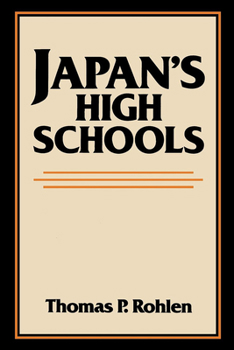Japan's High Schools
(Part of the Center for Japanese Studies, UC Berkeley Series)
Select Format
Select Condition 
Book Overview
". . . Rohlen's book achieves exciting conjectural stances while providing us with rich and trustworthy substantive data and description. His treatment of schools as 'moral communities, ' his call for new, culturally sensitive definitions of moral and creative goals in children's education, his interest in the consensus between parent, school, and society which underlies effective schooling are reason alone why this book should be read by anyone interested...
Format:Paperback
Language:English
ISBN:0520048636
ISBN13:9780520048638
Release Date:August 1983
Publisher:University of California Press
Length:360 Pages
Weight:1.30 lbs.
Dimensions:0.9" x 6.0" x 8.9"
Customer Reviews
1 rating
Brilliantly written and spot-on accurate
Published by Thriftbooks.com User , 23 years ago
There is no greater determinant of modern culture (in any society) than its education system. As the average parent doesn't have the motivation or inclination to raise, intellectually, his or her child, it is left to the school system to do this hideously complicated task. In all industrialized nations, there exists the responsibility to mold citizens into forms suitable for the purposes of the State; in Japan, this task is undertaken with a zeal and level of systematization without peer in the non-communist world. Rohlen's study of the high school system there touches on everything: political origins of the system, physical architecture of schools, the (already infamous) national examination system, the teachers' union and its endless (pointless) struggles against the Ministry of Education, social lives and adolescent development of the students, instruction styles and classroom atmosphere, etc. Field work at 5 totally distinct high schools in Kobe provides first-hand accounts of school organization and teacher-student relationships.Rohlen clearly wants to give a balanced account of his research, and does so by interjecting appropriate comparisons with American schools at key points. Indeed, it is his goal that the book provide a important perspective for American educators -- a look at the Japanese education system as "a mirror, not a model" for our own system. In this respect he succeedes fantastically. However, it is clear as the book continues that he is shocked and appalled at the nature of the education system widely regarded (in the 1970s and 80s, at least) as one of the best in the world.Still, the book's finale is a sudden rebound from the logical conclusion he seems to be driving toward. The final paragraphs of the book appear to come, indeed, from left field. The author admits in the Introduction that his analysis is heavily weighted toward a comparative study with American schools; he has no experience with the education of any other nation. In this sense, the Conclusion is a bit hasty. There are more than two education systems in the world, and there are more than two ideologies covering them. If the desired result is some amalgam of the Japanese and American systems, it would be wise to look at some systems which already practice precisely that; the national education systems of the Scandinavian countries come to mind.Finally, however, the book is immensely well-written, obvservant, and fair. Nothing the author claims is left to the reader to take on faith -- it is all backed up with documented statistics (not too many of these, don't take offense yet), interviews, and first-hand observations which never stray into the realm of over-generalizations. Highest recommendation.





